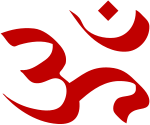تانبه:دين/Selected article/7
Hinduism (Sanskrit: Sanātana Dharma Script error: The function "Lang" does not exist. "eternal law") is a religion that originated on the Indian subcontinent. With its foundations in the Vedic civilization, it has no known founder, being itself a conglomerate of diverse beliefs and traditions. It is considered the world's "oldest extant religion," and has approximately a billion adherents, of whom about 890 million live in India, placing it as the world's third largest religion after Christianity and Islam. Other countries with large Hindu populations include Nepal, Bangladesh, Indonesia, Malaysia, Thailand, Sri Lanka and Pakistan.
Hinduism provides a vast body of scriptures. Divided as revealed and remembered, and developed over millennia, these scriptures expound an equally vast range of theology, philosophy, and myth, providing spiritual insights along with guidance on the practice of dharma (religious living). Among such texts, Hindus revere the Vedas along with the Upanishads as being among the foremost in authority, importance, and antiquity. Other important scriptures include the Tantras and sectarian Agamas, Purāṇas and the epics: the Mahābhārata and the Rāmāyaṇa. A deeply profound conversation excerpted from the Mahābhārata, called the Bhagavad Gītā is widely studied for summarizing the spiritual teachings of the Vedas.

